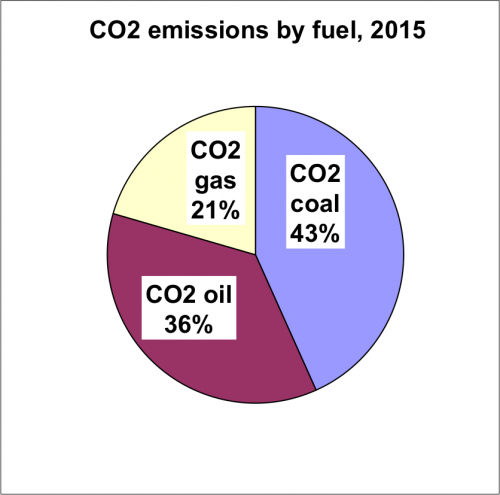Natural gas is frequently presented as the ideal energy for the future. Indeed it does have a certain number of advantages:
- it is still relatively cheap for the moment,
- it is relatively abundant: estimations for proven reserves vary between 65 and 100 years of the present consumption,
- it is better dispatched at the surface of the globe than oil, for which reserves are massively concentrated in the Middle East,
- it does not contain as much minor elements leading to local pollution (sulfur, particles, heavy metals, etc) than oil or coal,
- it contains less carbon per unit of mass than other hydrocarbons, and therefore its combustion frees less CO2 (which enhances the greenhouse effect).
But turning the gas into a miracle energy would be a little preposterous:
- even though it contains less carbon that oil or coal, gas still generates significative CO2 emissions: its use allows a diminution of “only” 25% of the CO2 emissions compared to oil (for a same quantity of freed energy) and “only” 40% compared to coal.
| Combustible | CO2 emitted (kg carbon equivalent by ton oil equivalent*) | Emissions by toe compared to those of natural gas | Emissions by toe compared to those of coal |
|---|---|---|---|
| Natural gas | 651 | 0% | -42% |
| Coal (average value) | 1.123 | +73% | 0% |
| Oil and petrol | 830 | +27% | -26% |
| Heavy fuel oil | 890 | +37% | -21% |
| Diesel oil and domestic fuel oil | 856 | +31% | -24% |
| LPG | 731 | +12% | -35% |
| Kerosene | 845 | +30% | -25% |
| Oil coke | 1.096 | +68% | -2% |
(*) 1 toe = 11600 kWh = 42 GJ
The above table means the following : when one burns one ton of oil equivalent of heavy fuel oil (which means that the amount of energy obtained from this combustion is 11600 kWh or 42 billion Joules, noted 42 GJ), this frees 890 kg carbon equivalent of CO2 in the atmosphere, that is 37% more than if the same quantity of energy had been obtained through burning natural gas, but 21% less than if this energy had been obtained through burning coal.
- As a result, even though it does not contribute as much as oil or coal, gas is a significant source of CO2 emissions in the world

Breakdown of the world CO2 emissions coming from fossil fuels in 2015.
For an energy consumption which is roughly 20% below coal, gas emits 2.5 times less, but it is still not zero !
Source : Author’s calculations on energy data coming from BP Statistical Review, 2016
- natural gas is essentially composed of methane, which is a greenhouse gas 28 times more powerful than CO2. If there are leaks in the distribution system that amount to 4% from the well to the final user (which is way over the real figure in most countries, but in some places in the world it is not totally excluded that such a high percentage might be reached, for example in Russia), natural gas becomes as “nasty” for the climate as coal.
- it is no more renewable than oil, and in Europe supply is becoming an issue,
- in particular, a total substitution of coal and oil by gas, to allow a relatively “cleaner” energetic system, would result in a gas consumption multiplied by 4 to 5 !
Therefore an increase of the share of gas in the short term, in order to start a decrease of the emissions while giving us the time to decrease our energy consumption, increase the share of renewables (but they are limited), or that of nuclear energy, is someting that can be supported. But converting everything to gas is not a long term miraculous solution.